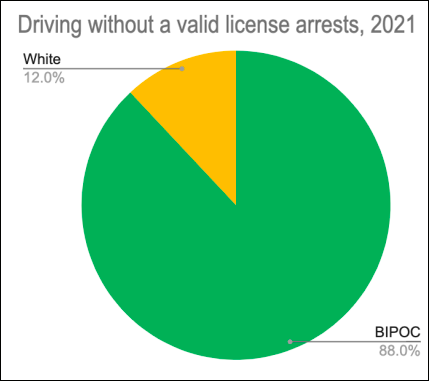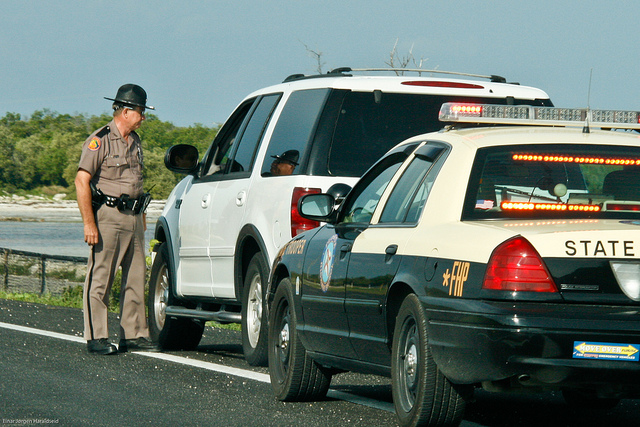More than 90 percent of the people arrested for common petty offenses last year were of Black and Brown New Yorkers, according to a new report by The Legal Aid Society, including 88 percent of arrests for driving without a license — piling onto already alarming data that reveals the racial bias in the NYPD’s policing of public space.
Twenty-two of the 25 people arrested last year for driving without a license were of people of color, and Legal Aid’s data show that cops arrested just three White people (or 12 percent) for the same offense. Such encounters that can lead to police brutality against Black and Brown people, like the 2019 fatal shooting of Allan Feliz, whom cops killed during a so-called routine traffic stop in the Bronx.
Punitive punishment, whether in the form of cash fines or sending someone to jail for not having a valid license, is not the solution to fewer crashes, experts and advocates argue — it’s safer streets by design.
"When it comes to safety on the roads, the evidence shows that improvements in street design and infrastructure are more effective than harsh enforcement of minor infractions,” said Antonya Jeffrey, New York State Director at the Fines and Fees Justice Center. "We should take advantage of the innovations technology affords us and reimagine our streets by investing in infrastructure that increases public safety and respects all communities.”

Legal Aid looked into the data following the NYPD's announcement last week that it would be launching a "quality of life enforcement initiative," also known as broken window's policing, and Mayor Adams's apparent zero-tolerance policy when it comes to cracking down on petty crime, including homeless people sleeping under the Brooklyn-Queens Expressway.
Legal Aid could not provide a breakdown of the data showing how many invalid license arrests followed someone being pulled over or because of a crash — such as the tragic case last year when a driver, who should never have been behind the wheel that day, killed 3-month-old Apolline Mong-Guillemin at a Brooklyn intersection. Nor did Legal Aid assess why so few people of any race are arrested at all for driving without a valid license when, in fact, hundreds of people are driving around every day with suspended or revoked licenses, according to DMV statistics.
In any event, the process of revoking licenses is also layered with its own inequities. Most people aren’t stripped of their privileges to get behind the wheel simply for dangerous driving — in fact, they hardly ever are — but more often for not being able to pay tickets that they can’t afford, or even for failing to pay child support.
The Driver’s License Suspension Reform Act went into effect last year, putting an end to the practice of taking away someone’s license for not being able to afford to pay a traffic fine, but it’s still not foolproof in preventing many low-income people of color from getting swept into and trapped in the “vicious cycle of poverty and punishment,” according to Jeffrey.
"One of the most common arrests in NY has been for driving with a license that was suspended simply because the individual couldn't afford a ticket for a minor infraction," said Jeffrey. "Thanks to the Driver's License Suspension Reform Act, some New York City residents should be able to get their licenses restored. But even after reform, most suspended licenses are for reasons associated with poverty, not dangerous driving.”
Legal Aid’s data also revealed that every single person arrested in 2021 for “loitering” — five in total — was Black, and that of the 1,114 people arrested for fare evasion, 91.4 percent were people of color — encounters that also often lead to violent interactions.
Arrest happening now for hopping turnstile at Nostrand @changethenypd @NYCMayor pic.twitter.com/f9wwbPMbeo
— Jason Walker (@LamarSpeaks) March 25, 2022
And the report follows Streetsblog’s own analysis of tickets issued to cyclists for biking on the sidewalk, of which 86.4 percent went to Black and Hispanic New Yorkers. This week's episode of Charles T. Brown's "Arrested Mobility" podcast is dedicated to that topic:
Episode 2 (Sidewalk riding) of the #ArrestedMobility podcast is out and the guests don’t disappoint! In this episode, we take you to #Chicago and connect with Olatunji Oboi Reed, Patric McCoy and Jesus M. Barajas. Should #sidewalk riding be allowed? https://t.co/w8hD6VUVm2
— Charles T. Brown, MPA, CPD (@ctbrown1911) March 30, 2022
We asked the NYPD to comment, and the agency sent over a statement from Deputy Commissioner for Public Information John Miller:
Legal Aid is correct that quality-of-life enforcement will not solve the problems of society, nor will just ignoring it. The NYPD has an obligation to respond to complaints. Whether the call comes in from a mother in Brownsville or a shopkeeper on the Upper East Side, they are both entitled to a police response and where a warning fails, some enforcement that will correct the condition may be necessary. It’s called serving the public.






